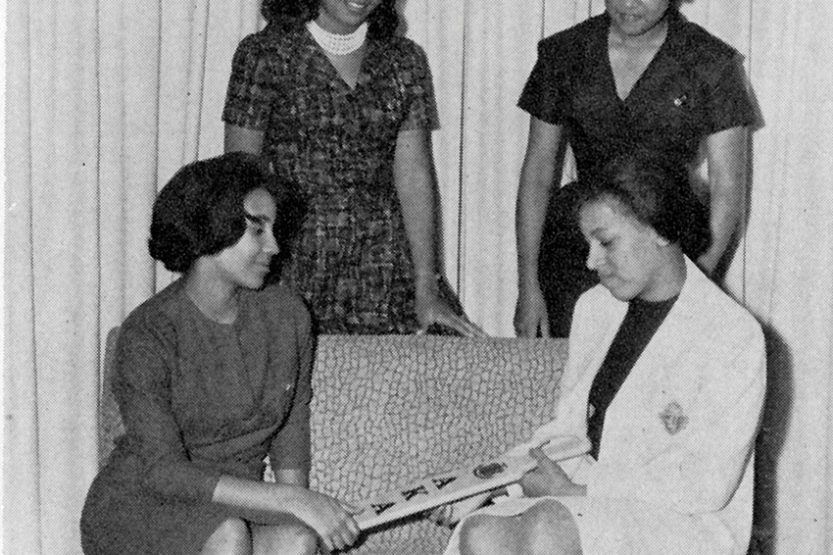Sister Act
 AKA officers photo from 1961 Illio yearbook. (Photo courtesy of UI Archives 0003673)
AKA officers photo from 1961 Illio yearbook. (Photo courtesy of UI Archives 0003673) The hallways of the I Hotel were packed as women sporting pink-and-green T-shirts greeted one another with huge hugs and smiles. Alpha Kappa Alpha, Gamma Chapter, was celebrating its centennial on the University of Illinois campus. Warmth and love filled the air; oxygen molecules found room where they could. In that moment this past winter, you felt you could do anything you set your mind to, as long as you had the support of these magnificent, high-energy women.
It’s the same kind of energy that brought the sorority to the U of I. Alpha Kappa Alpha Sorority Inc., the first such group in the nation for African-Americans, was established in 1908 at Howard University in Washington, D.C. Six years later, eight women at Illinois established the third (Gamma) AKA chapter—the first African-American sorority at a predominantly white, public institution.
Think on this: One hundred years ago, when women could not vote and rarely worked outside of the home, these founders had an outsized dream.
The Illinois campus, however, offered a somewhat chilly reception. Although its residence halls were first built in 1916, African-Americans were banned from them until the 1940s. African-American sororities were not allowed to join the Panhellenic Council until 1947.
The AKA sorority, then, provided a gathering place for these students, and the chapter occupied various houses from the 1920s to the 1970s.
“The sorority was important to people who belonged to it,” says Carol Ballinger Johnson ’54 LAS, whose mother, Frances Irene Ellis, was a charter member of the Illinois chapter. “It was a close-knit group of people.”
According to Tamara Hoff ’05 LAS, MA ’08 ED, an AKA member whose dissertation includes the history of the chapter from 1901-1939, the Gamma Chapter served as a “network of support, a community and a cultural outlet.”
The sorority also provided a place to learn leadership skills, as virtually all student organizations were closed to African-Americans before the 1950s.
From the beginning, AKA set its bar high, says Hoff, with academics a top priority. In 1919 Gamma Chapter had the highest GPA of any sorority on campus, and in 1938, AKA member Marian M. Singleton ’38 aces was the first African-American woman to earn Bronze Tablet honors, the highest recognition bestowed by the University.
By the time Lolita Smith ’83 LAS, MD ’88 (uic), pledged in 1980, African-American women had become more integrated with the campus, but she still felt the need for a kind of family.
“It’s a sisterhood, even though we weren’t birthed by the same moms,” Smith says. “It’s not that I was scared, exactly, but I wanted a bigger voice.”
Bria Purdiman ’14 MEDIA, Smith’s daughter and outgoing AKA president, always knew she’d join AKA. “My mom’s [sorority] sisters are my aunties,” she says.
The close bond is clear: Of the 16 women who pledged with Smith in 1980, 13 attended the weekend’s events. Now that’s a family reunion.

